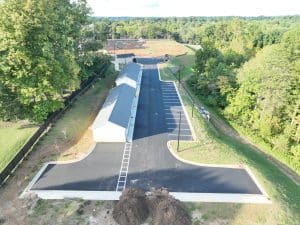When it comes to paving a road or driveway you typically have two choices of material to choose from asphalt or concrete. Prime Paving and Sealcoating offer both options for our customers including concrete installation, concrete driveway repair, asphalt paving, and asphalt driveway repair. However, as a property owner, you may be asking yourself which is stronger? Asphalt or Concrete?
To answer this question let’s first define what asphalt and concrete are made up of.
Asphalt
Asphalt is a paving material made up of aggregate, finely crushed stone, and a binder made from crude oil. It is premixed and poured into a previously created roadbed consisting of a heavier aggregate then pressed into place via a steamroller. Due to its binder, bitumen, being created from crude oil the surface of the asphalt is always a rich black.
Concrete
Concrete is also a paving material made up of a mixture of aggregate and binder. However, the binder that holds the concrete together is a mixture of cement and water. The surface of concrete can be stained and customized in color and texture.
Which surface is stronger, asphalt or concrete?
Asphalt and concrete are both extremely strong surfaces for paving. Professional paving companies understand a rating system called structural numbers and both asphalt and concrete have a rating of 3.0. Due to this number, it would be easy to assume that they both have the same strength but there are other factors that must be taken into consideration.
Factors that affect the strength of asphalt and concrete
One of the major factors to consider between the two is how they are poured, and the roadbed being used. Asphalt has more flexibility and is more forgiving than concrete is. Concrete requires more prep work and technique to pour than asphalt does.
Once asphalt cools to the surrounding air temperature it can be driven on, this typically happens around 24-48 hours depending on the weather. However, concrete has a more significant drying time.
Once concrete cures it is very stable and can handle immense weight from a variety of sources. But because concrete is not as flexible as asphalt it is prone to cracking when the weather turns colder. Repairing cracks in concrete is not as easy as asphalt. If your concrete does crack Prime Paving and Sealcoating does offer concrete repair and can assist you.
In contrast, asphalt repair is easier. Asphalt can be patched as needed, as well as, resurfaced with a new overlay to extend its lifespan. However, asphalt does require more maintenance through the need to sealcoat every 3-5 years. Concrete has very little maintenance only needing to be degreased occasionally.
Nevertheless, if concrete is poured well by a professional contractor it can last between 30-40 years which his longer than quality asphalt which lasts between 20-30 years.
Uses for Asphalt & Concrete
Most roads today are made using asphalt but there are still some roads that use concrete. The flexibility and the fact that asphalt is not as prone to cracking makes it an ideal surface to use.
Yet, concrete is used to reinforce asphalt via curbs, drains, and sidewalks. Private homeowners regularly use concrete for their driveways since they have longer durability and options for color. Staining concrete can allow a homeowner to have their color complement their home’s exterior. And with concrete having a lighter color than traditional asphalt it does not retain heat but reflects the sun’s rays instead.
In conclusion, both asphalt and concrete are highly stable, durable and strong paving materials. Each with their own benefits and weaknesses. If you are looking for a quality concrete installment, repair, or asphalt paving look no further than Prime Paving & Sealcoating.
We are experts in our line of work and can help you get started with a free estimate. Contact us today!







